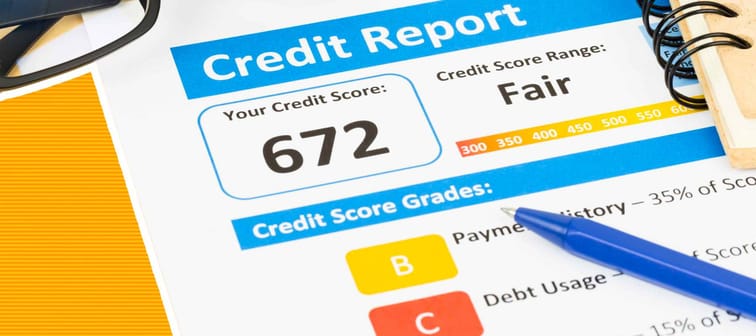How your credit score is calculated
Your credit score is determined by analyzing financial information from the three major credit bureaus: Experian, Equifax and TransUnion.
FICO is the most widely used credit scorer.
After analyzing your credit report information, you are assigned a score somewhere between 300 and 850.
The credit bureaus have different criteria for collecting data, so your score may vary slightly between the three. If you don't know your credit score, you can easily check yours for free using a company such as Credit Sesame.
The FICO score scale ranges from "very poor" to "exceptional," and is based on five main factors. Each factor counts toward a percentage of evaluating your FICO score.
- Payment history: 35%
- Credit utilization: 30%
- Credit history 15%
- Credit mix: 10%
- New credit: 10%
More: Check your credit score for free
Scammers are smarter than ever—are you protected?
The average American gets 2 scam calls and 3 scam texts every week. Think you can spot them? AI is making scams harder to detect, and in 2023 alone, Americans lost $12.5B to cybercrime. Don’t be next—learn how to protect yourself now!
Learn moreFactors impacting your credit score
As you can see, the categories vary in importance in determining your credit score. Let’s take a closer look at each.
1. Payment history
Payment history carries the most weight, which means it’s crucial to make every bill payment on time. Even one late payment has a negative impact, and it could stay on your record for up to seven years. It becomes less important over time if you catch up on your bills and stay current.
Debts that go into collection are even more damaging, so don’t make your creditors come after you. Call them at the first sign of trouble, preferably before bills are due or late.
Many lenders will work with you on a repayment plan or schedule a more convenient due date.
Taking out a debt consolidation loan could help you get your debt under control — and help bolster your credit score.
Earn cash back on what you buy most
Maximize your spending and earn up to 6% cash back on groceries, streaming, gas, and more. Whether it’s everyday purchases or splurges, this card puts money back in your pocket.
Learn more2. Credit utilization
A debt-to-credit ratio compares how much credit you’re using to how much you have available. To calculate it, add up all your balances owed. Next, add up all your spending limits. Divide the first total by the second to get your utilization rate.
Creditors frown on ratios above 30%. If your spending limit on a card is $6,000 and your balance is $2,500, your utilization rate is 42%. That will hurt your credit score.
Zero to 10% utilization is ideal, so work to pay down your balances before you incur more debt. And don't be too quick to cancel your credit cards, because that can shrink your available credit and potentially raise the percentage of credit that you're utilizing.
3. Credit history
There's another good reason not to be too eager to close accounts, even after you've made the very last payment: Lenders prefer doing business with borrowers who have experience with credit.
FICO factors in the average age across all your accounts and the age of the oldest one. Provided your record is squeaky-clean, maintaining long-term relationships with creditors improves your credit score.
4. Credit mix
The mix of credit you're using doesn't carry as much weight as the first three categories, but it's worth keeping in mind.
Lenders like to see that you can manage different types of accounts responsibly. A healthy mix might include a mortgage, a car loan, a personal loan, and two or three credit cards.
5. New credit
New credit also is a lesser factor in determining your credit score, and it's one that can either help or hurt your score.
A new account can raise the amount of credit you have at your disposal — and help hold down your credit utilization. But a flurry of credit applications all at once may set off alarm bells. Lenders will wonder if you got sacked at work or are living beyond your means.
If you’re trying to build a more robust credit mix and boost your score, do it gradually. Don’t apply for a mortgage, a car loan and three credit cards all at once.
Other things that can (and won't) impact your credit score
While your history of paying utilities, rent and some other expenses didn’t used to have any bearing on your credit score, that is changing. For instance, there are some companies now that will report your rent payments to the credit bureaus, and you could see a boost in your score as a result.
Also, when you apply for new credit, lender inquiries can slightly, temporarily ding your score. It typically rebounds after you’ve paid on time for a few months.
Factors that won't affect your FICO credit score include your assets, income, occupation or age.
Checking your credit score on your own has no impact either.
VantageScore: An alternative to FICO

Another popular credit scoring model is VantageScore. Its criteria are similar to FICO’s, but the categories that impact the score are weighted differently.
Here's how VantageScore calculates your credit score:.
- Payment history: 41%
- Credit history and mix: 20%
- Credit utilization: 20%
- New credit: 11%
- Credit balances: 6%
- Available credit: 2%
VantageScore was introduced in 2006, and then released an update as VantageScore 4.0 in 2017. The VantageScore 4.0 model places less significance on past credit history and more emphasis on payment history and new credit.
VantageScore advises keeping your debt-to-credit ratio under 30%, diversifying account types, and keeping accounts in good standing and open for as long as possible.
In several ways, VantageScore is more generous than FICO. Scores are not affected by paid or unpaid collections of less than $250. Accounts that took a hit during a natural disaster are not taken into consideration.
Check your credit score
Knowing your credit score — and keeping it nice and high — could make all the difference in the quality of your financial life. You can get a free credit score — plus credit monitoring — from Credit Sesame.
This 2 minute move could knock $500/year off your car insurance in 2025
OfficialCarInsurance.com lets you compare quotes from trusted brands, such as Progressive, Allstate and GEICO to make sure you're getting the best deal.
You can switch to a more affordable auto insurance option in 2 minutes by providing some information about yourself and your vehicle and choosing from their tailor-made results. Find offers as low as $29 a month.









